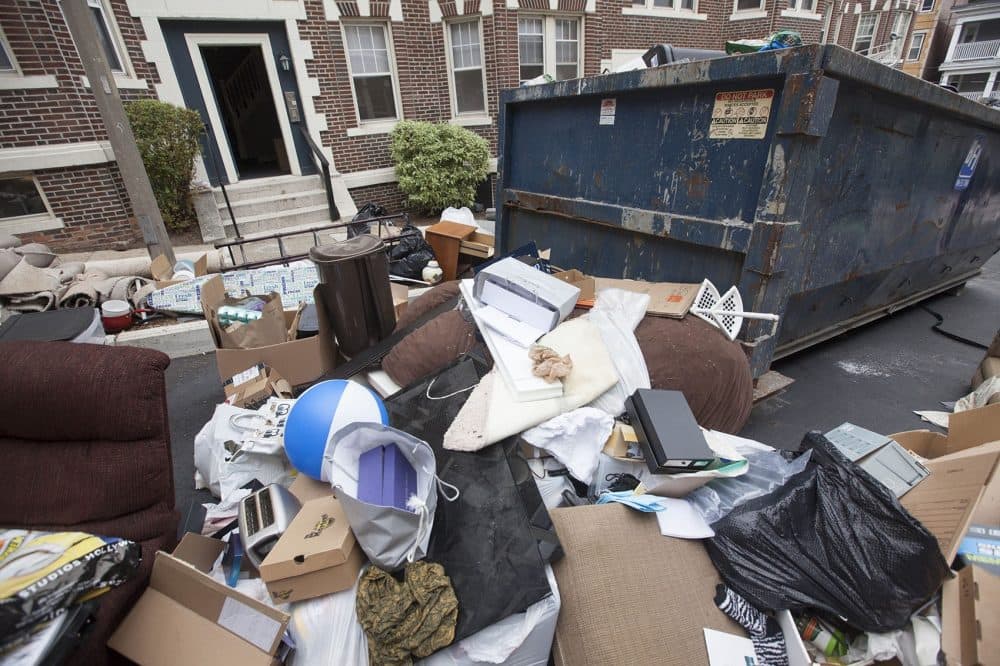Advertisement
Get that mattress off the curb! Here's what to know about Massachusetts' new waste bans
Resume
People and businesses in Massachusetts throw away more than 5 million tons of trash each year. The state's goal is to cut this waste to 4 million tons by 2030, and to a mere 570,000 tons by 2050.
The state already has a list of things you're not supposed throw in the trash, including glass, metal, lead-acid batteries, bricks and asphalt.
On Nov. 1, the state adds three more: textiles, mattresses, and a certain level of commercial food waste.
Here's what you need to know:
What are the three new waste bans?
- Commercial-scale food waste: The state already has a ban on commercial food waste. The new, stricter ban says any business producing more than a half-ton of food waste per week cannot send it to landfills or incinerators.
- Mattresses: You know what those are. These bulky items now must be recycled.
- Textiles: This is a long list including clothes, footwear, bedding, towels, stuffed animals, curtains and fabric.
Am I gonna get fined for throwing out old towels? (And how would they know, anyway?)
Unlikely.
"We generally do not enforce our waste bans against individuals," said John Fischer, Deputy Division Director for solid waste at the Massachusetts Department of Environmental Protection (MassDEP). "When we enforce our waste bans, we're looking to enforce them against entities that are disposing of large amounts of banned material, and that typically means we're enforcing against businesses and institutions."
The DEP also inspects loads of residential waste, and can fine the hauler, or cities and towns, for breaking the rules.
If I'm not gonna get in trouble why should I bother recycling this stuff?
Short answer: there's a lot of it! And it could be put to better use.
Food waste is the largest single item in the waste stream — it makes up about 21% of total waste, or about 925,000 tons each year. The state hopes to reduce the amount of food waste in the trash by an additional 500,000 tons by 2030. And if it can be used for compost or anaerobic digestion, it can do some good.
Less of our trash is textiles — about 5% or 250,000 tons a year. The DEP says 95% of textiles in garbage can be reused or recycled. Similarly, about 600,000 mattresses go to landfills and incinerators each year, and their bulk makes them difficult to handle. The DEP estimates that 75% of mattress components can be separated and recycled, including metal and wood, as well as fabric and padding.
What are 'textiles,' exactly?
Here's the list DEP sent me:
- Clothing: Shirts, pants, jackets, suits, hats, belts, ties, gloves, scarves, socks (even single ones) undergarments, handbags, backpacks in any style, age or condition.
- Footwear: Shoes, sandals, sneakers, cleats, boots, flip-flops, and slippers
- Household textiles (even stained and torn items): Curtains, drapes, sheets, blankets, comforters, towels, table linens, throw rugs, pillows, stuffed dolls and animals
Whew, that's a lot of stuff! If I can't trash it, what am I supposed to do with it?
First off, don't throw it into your recycling bin!
The state has information about where consumers can donate mattresses or textiles for recycling. You can also contact your town or a favorite local charity.
Textiles that are contaminated with mold, bodily fluids, insects, oil or hazardous substances should not be recycled. Depending on their state, they may need to go into hazardous waste.
Will the food waste ban hurt restaurants?
The state estimates that about 2,000 businesses were affected by the original ban, and 2,000 more will be included now. The state says about 1000-1500 of those newly-included businesses could be restaurants, but that would still represent only a small percentage of restaurants overall.
Industry advocates say the stricter food waste ban is not expected to hurt restaurants, because the cost of "diverting" food waste to compost or anaerobic digestion is often comparable to trashing it, at least in Massachusetts.
If you run a restaurant or other small business and need some guidance on food waste or other waste bans, the state runs a program called RecylingWorks to help reduce waste in a cost-effective way.
This segment aired on November 1, 2022.
